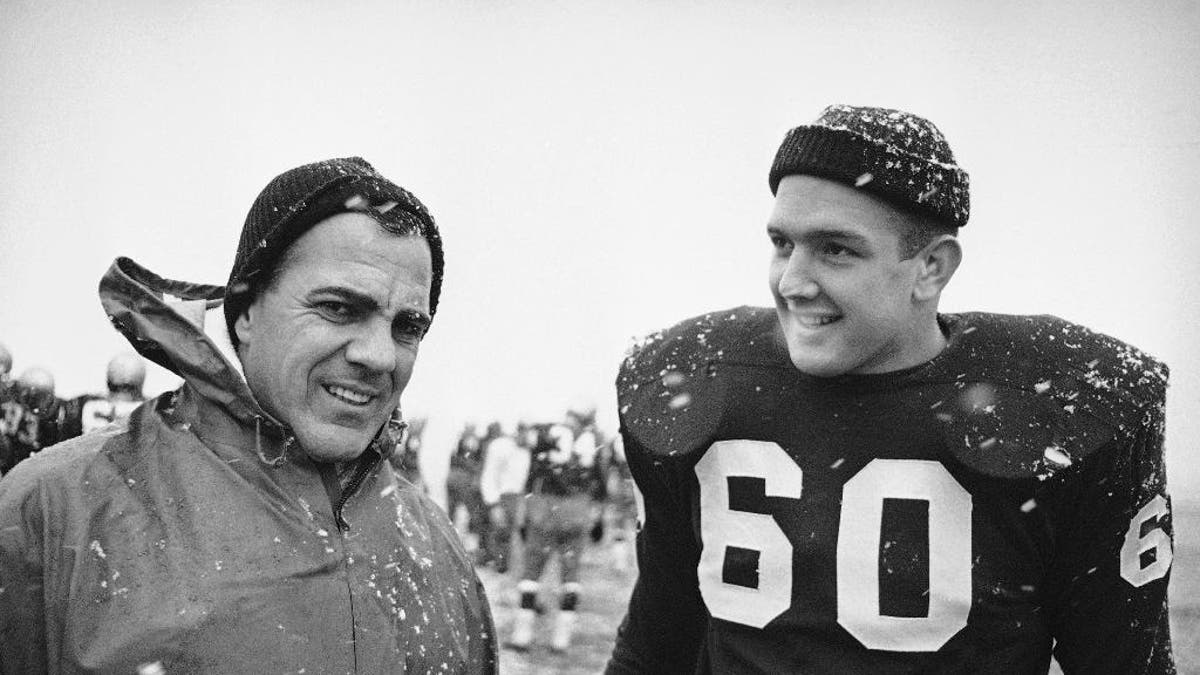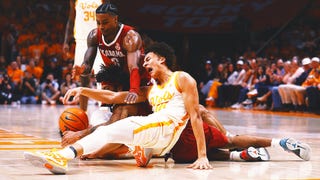
FILE - In this Nov. 20, 1964, file photo, Notre Dame coach Ara Parseghian, left, and team captain James Carroll are shown during a practice session in South Bend. Notre Dame was at rock bottom when Ara Parseghian took over 50 years ago. The Irish finished the season 2-7 in 1963 and the only thing that kept them from matching the worst record in school history set in 1956 was the game against Iowa was cancelled because of the assassination of John Kennedy. (AP Photo/Charles Knoblock, File) (The Associated Press)
SOUTH BEND, Ind. – Notre Dame's glory days seemed like a distant memory 50 years ago when Ara Parseghian took over as coach.
The Fighting Irish finished 2-7 in 1963. The only thing that prevented them from likely matching the worst record in school history was a game against Iowa being canceled because of the assassination of President John Kennedy. The Irish were 15 years removed from their last national title and hadn't had a winning record in five seasons.
"I think we had been beaten up so much we had almost given up on life," team captain Jim Carroll said at a reunion earlier this month.
Enter Parseghian, who was 36-35-1 in eight seasons at Northwestern. He took over an inept Irish squad and led it to a 9-0 start and within 93 seconds of a national title.
Notre Dame has had some celebrated comeback seasons. Two years ago it was 12-0 in the regular season as a stalwart defense led the Irish to their first No. 1 ranking in 19 years. In 2002, it was short-lived return to glory with an 8-0 start under first-year coach Tyrone Willingham. The 5-6 record the Irish put up in Lou Holtz's first season in 1986 didn't look all that impressive at first glance, but they won four of their final six — with both losses coming in close games against top 10 opponents — hinting at the upcoming turnaround.
That was nothing like 1964.
"The talent was there. It was just misplaced," Parseghian said.
The Irish had what was known as the "Elephant Backfield," that included Jim Snowden (6-foot-4, 215 pounds), Paul Costa (6-4, 230) and Pete Duranko (6-2, 220). Parseghian moved Snowden to offensive tackle, Costa to defensive end and Duranko to linebacker. He moved other players around as well.
"It was Ara Parseghian putting the pieces of the puzzle in the right places," linebacker Jim Lynch said.
The other big move by Parseghian was naming little-used senior John Huarte, who hadn't even earned a letter his first three seasons, the starting quarterback.
"He went from a non-letter winner to a Heisman Trophy winner in one year. That's about as dramatic as you can get," Parseghian said.
One knock against Huarte was his awkward sidearm delivery.
"I didn't worry about that. I worried about results," Parseghian said. "He was getting the ball to receivers and had good touch. He had good speed. He could run our option. I mean, he was an athlete, and I don't know how they missed him."
Like a lot of Irish players, Huarte needed his confidence rebuilt.
"You were here for three years, you hadn't played. Sure your confidence was down," Huarte said. "But there were certain things I could do and Ara built the offense around things I was good at."
The Irish, who had scored more than 20 points just once during the 1963 season, opened the 1964 season with a 31-7 upset victory at Wisconsin. They followed that with a 34-15 win over Purdue and a 34-7 victory over Air Force. Players say they didn't begin thinking about vying for a national title until late in the season.
"From where we'd come from, we were just focused on each game as it came," end Phil Sheridan said. "We were never pointing toward anything but the next game."
The Irish jumped to No. 2 after a 24-0 win over UCLA in the fourth game and to No. 1 after a 40-0 win over Navy in the sixth game. They entered the season finale against Southern California 9-0 and looked like their first title since 1949 was within reach when they jumped to a 17-0 halftime lead. But the Trojans scored two touchdowns in two minutes, 12 seconds, taking a 20-17 lead when Craig Fertig completed a 15-yard TD pass to Rod Sherman on fourth down with 1:33 left.
"To lose that way was very disappointing and it becomes more disappointing as the years go on because you think about the ramifications if we'd won that game," Sheridan said. "It probably would have been the greatest turnaround in the history of college sports."
The Irish finished the season ranked No. 3 and won the national championship two seasons later and vied for several more titles under Parseghian as the Irish reclaimed their position as a college power.
"The campus, the players were hungry for Notre Dame to do well. I think the country was hungry for Notre Dame to do well. It was such a great Cinderella story coming out of nowhere," Lynch said. "Ara Parseghian woke up a slumbering giant."








































